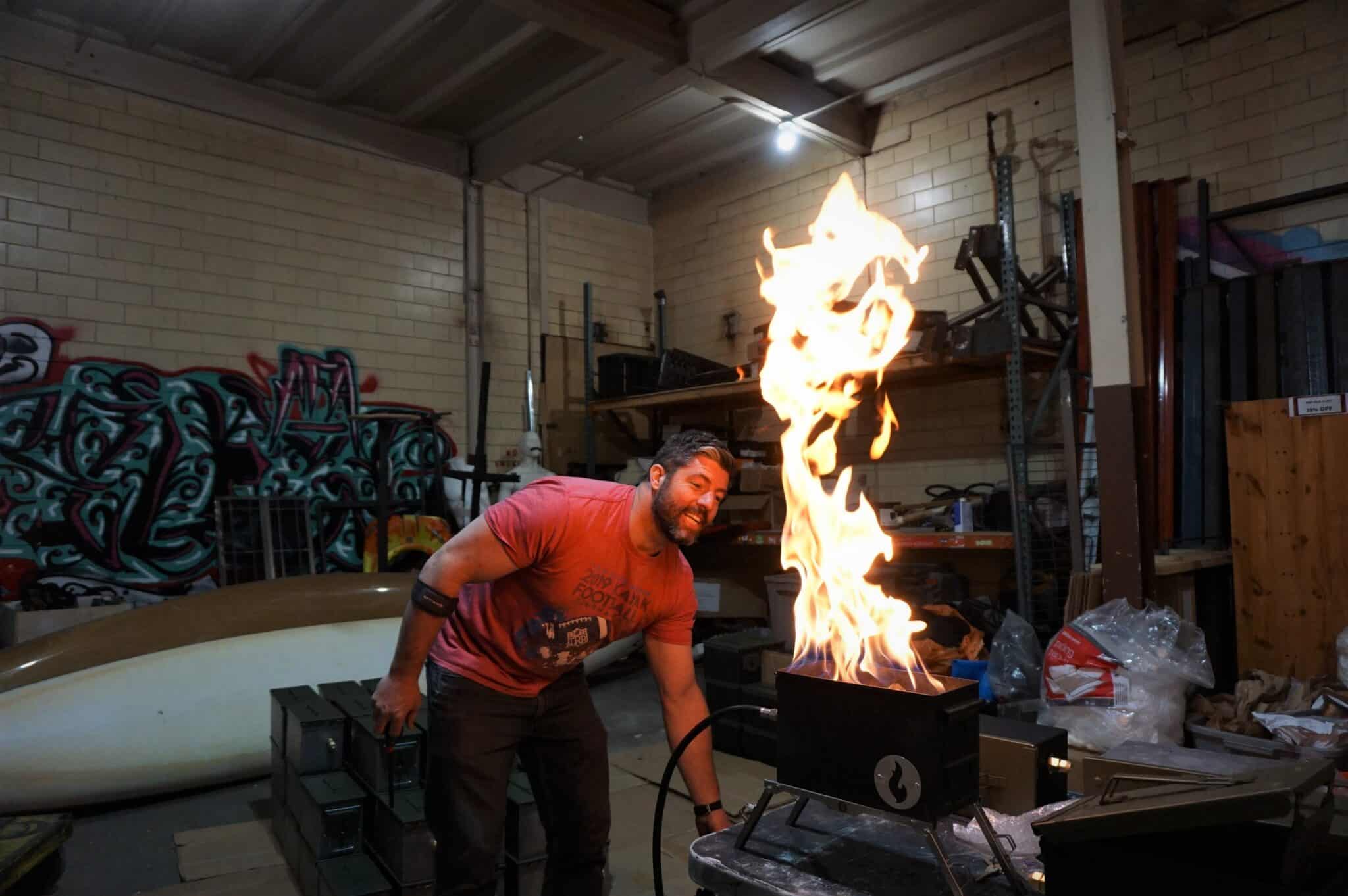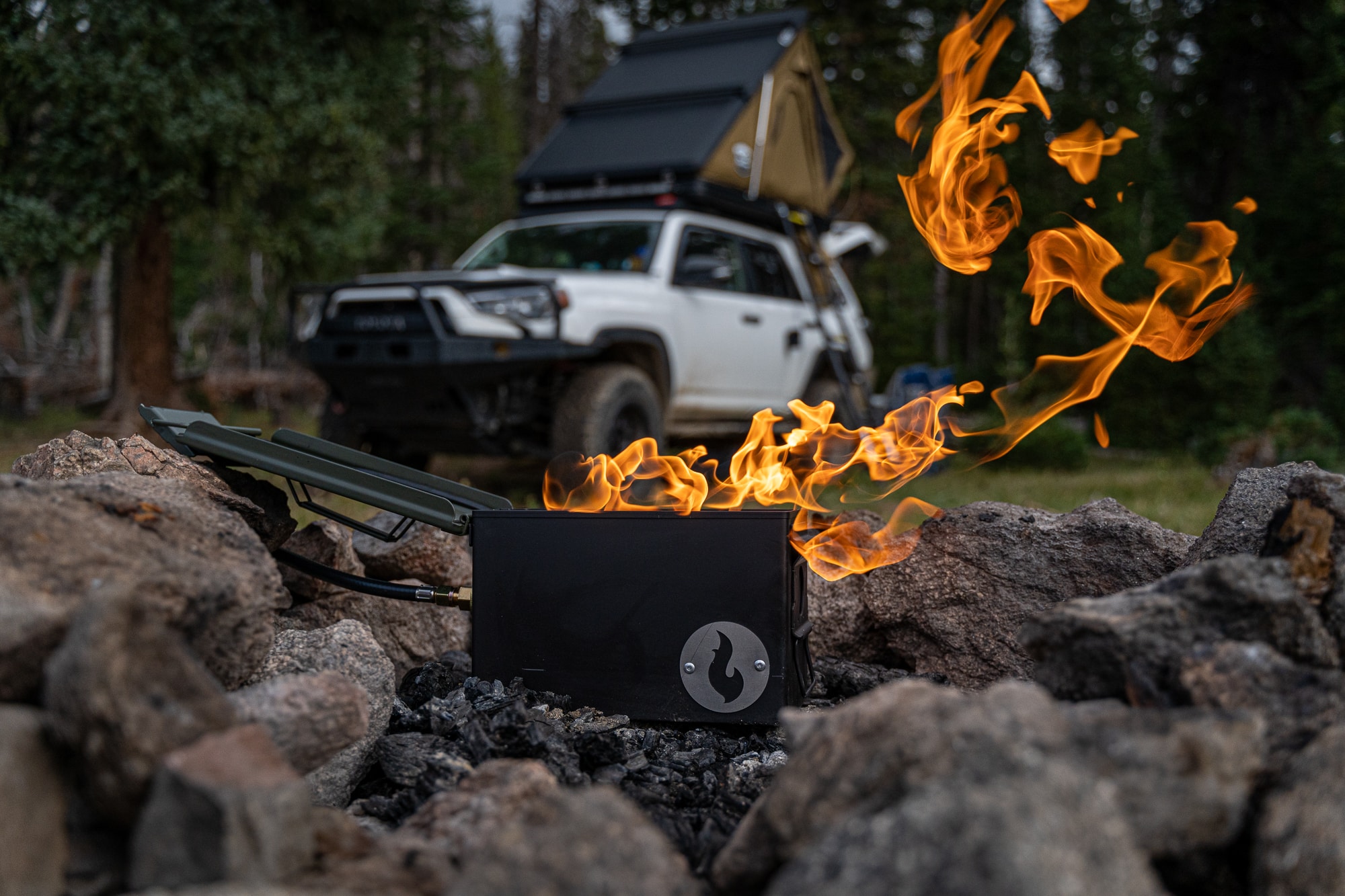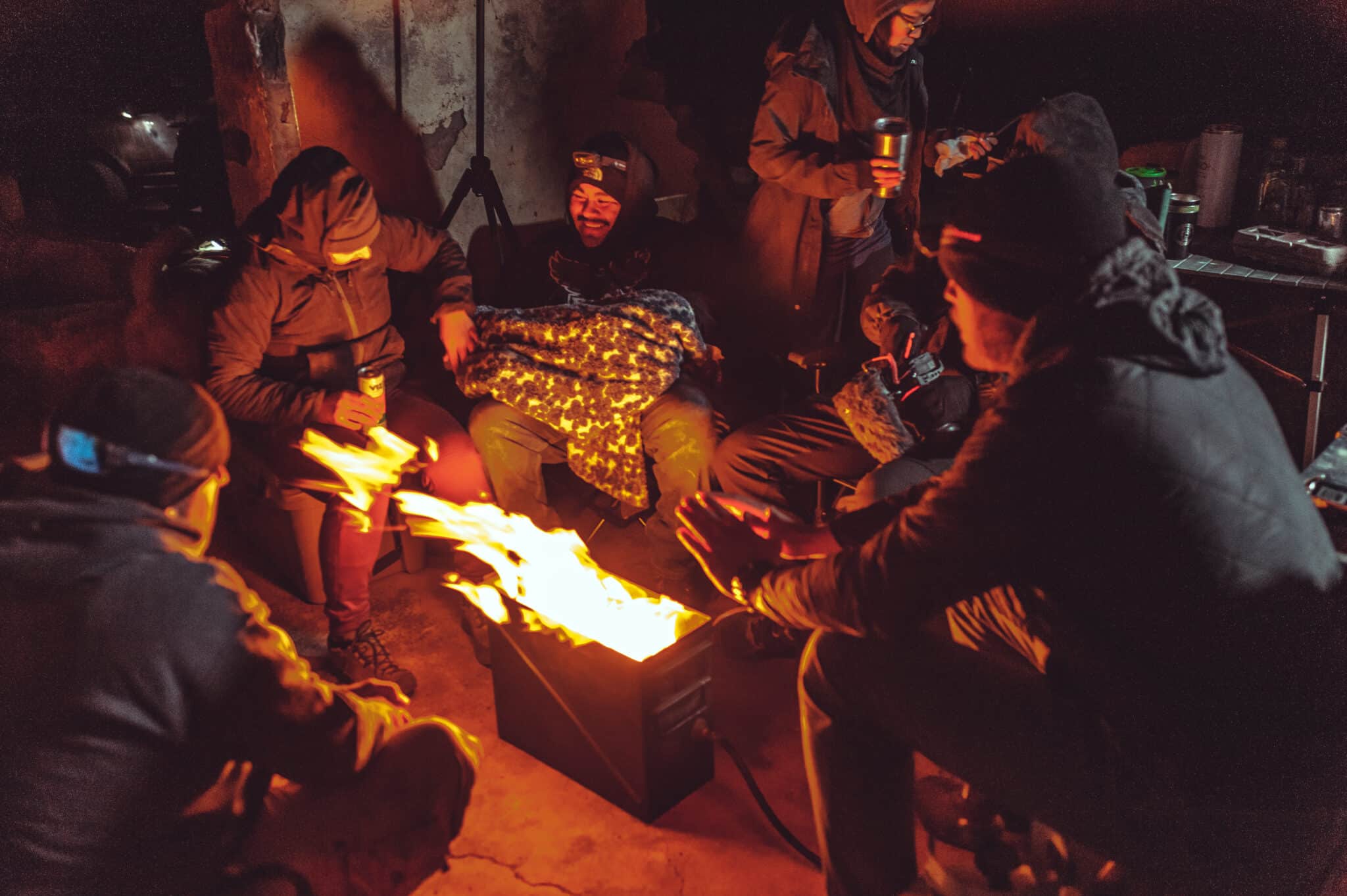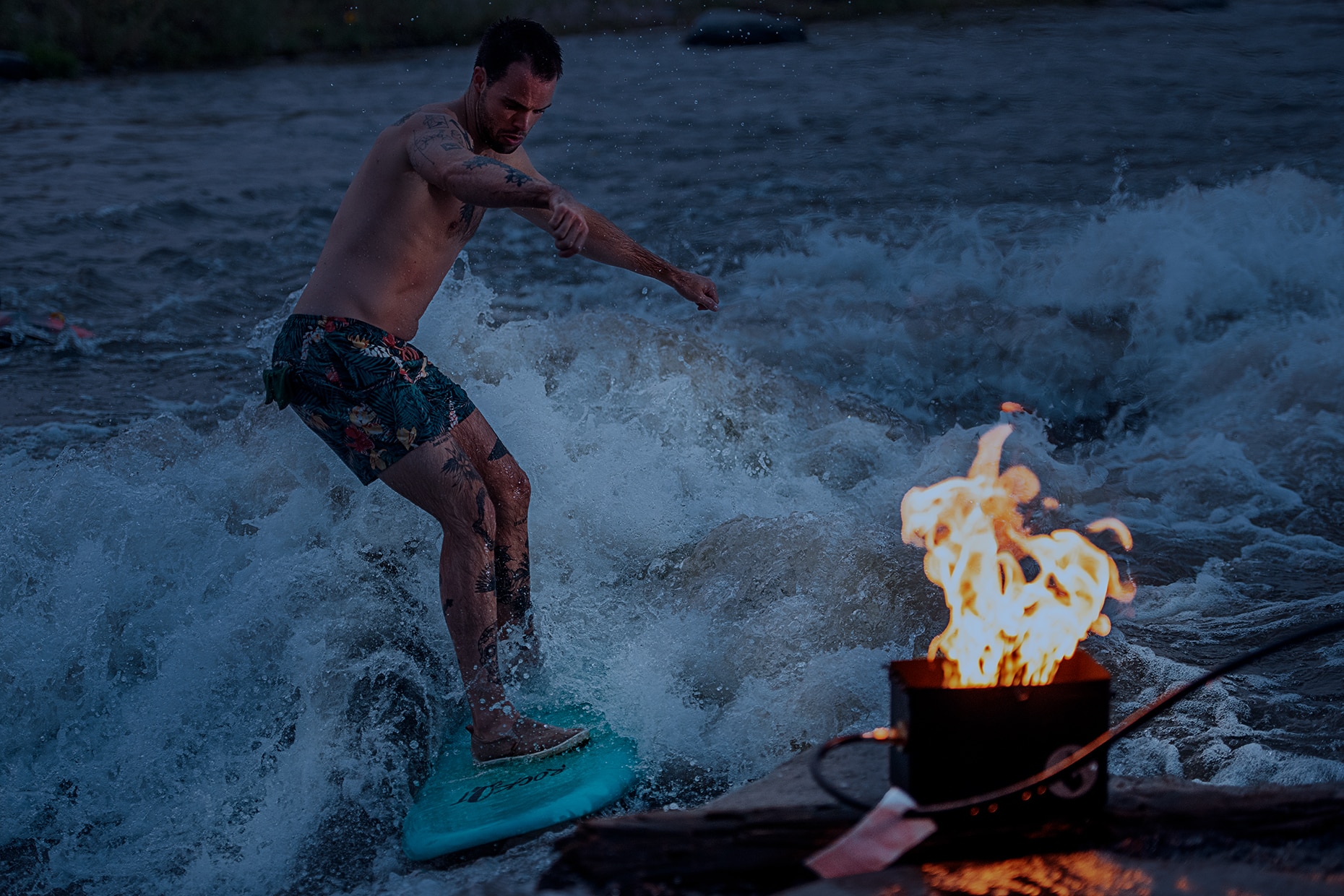
LavaBox founder Joshua Thurmond tests a Tabletop Vol-CAN-no in his Globeville warehouse, which he shares with Confluence Kayaks. (Lily O’Neill photo)
During forest fire season in the heart of the Rockies, Joshua Thurmond joined a group of fellow raft guides and kayakers for one last trip of the year.
Thurmond and the group were testing out a portable backyard fire pit near the Colorado River in September 2020 when someone joked about putting “the behemoth” on a raft, he said.
Everyone laughed. But it sparked an idea.
Thurmond, a 46-year-old raft, kayak and climbing guide with over 25 years of experience, was challenged to create a better campfire. He had always been a tinkerer and used to fashion adaptable equipment for the National Sports Center for the Disabled.
To create his own portable campfire, the Denver resident decided to put it in a military-style ammo box that guides often use on rafts because of their durability and waterproof exterior.
“I went home and built seven different models in a week or less,” Thurmond said. “I just went crazy and didn’t sleep in four days. Once I’m going, I’m going. I outfitted an entire van once in three-and-a-half months.”

The Tabletop Vol-CAN-no retails for $195 on the company’s website and in 21 small outdoor retailers around the country. (Photos courtesy of LavaBox)
In October 2020, he launched LavaBox, an outdoor adventure gear startup. The company sells two portable campfire options.
The Tabletop Vol-CAN-no, which retails for $195, is in a 50-cal ammo box and can warm six people. The Krakatoa FireBreather, which retails for $330, is in a 20-mm rocket box and can heat a group of 10 or more, with flames reaching up to six feet.
Both connect to a propane tank for use, and come with a propane regulator and hose. The smaller version comes with a stand and grill top to convert the campfire into a stove.
The regulator can be adjusted to a low burn, absolute inferno or cut off at any time, meaning it passes stage two fire restrictions. The Tabletop Vol-CAN-no has been acknowledged by the rangers of the Grand Canyon, “which is one of the most stringent,” as the safest fire they’ve seen so far, Thurmond said.
“We were really the tip of the spear on this because no one in wide-scale had adopted propane firepits,” he added. “I saw all the fire bans, but people still want fires. I have two kids, and my kids want fires every time. I was pushed by my friends, but I knew it needed to happen right now. I made 40 of them and sold them all in one day.”
Thurmond said he has sold 4,000 units of the Tabletop Vol-CAN-no and 130 units of the Krakatoa FireBreather, the latter of which just started shipping to customers this month since it’s hard to find the rocket boxes. He said most of his customers are campers or use it on their patio.
One of LavaBox’s earliest customers, Mark Leffingwell, even uses it like a gas fireplace in his house.
“My girlfriend and dog love falling asleep in front of it,” Leffingwell said. “I just prop it up in my fireplace, and I have a propane tank hidden behind a chair in my house. We use it a lot, and it’s even nice for hiking. We have it in the car and when we get back from our hike, we pull it out and get a little fire going, have a beer and eat some Jimmy John’s.”
Leffingwell, a freelance outdoor photographer, bought the Tabletop Vol-CAN-no in 2020 and said he’s been using it as a solution to the fire bans over the last couple of years.
“We were the only person last year with a fire going by Granby Lake, and even the campground host was about to tell us to put it out before he saw that it passed the fire restrictions,” Leffingwell said.
“Camping without a campfire sucks,” he added. “A big part of camping is sitting around the campfire at night and drinking whiskey, talking politics with your friends, or roasting marshmallows with your kids. You’re not just going to sit around and look at each other with flashlights.”
Thurmond made the first batches of LavaBoxes in his garage to start. But now he’s getting the boxes manufactured in Vietnam and China and branding them with the help of some friends in a 5,000-square-foot warehouse at 4800 Washington St. in Globeville. He shares the space with Confluence Kayaks, which uses it for storage.
The outdoor entrepreneur applied for a patent in January last year to cover the style of the burner in the LavaBoxes and the way it functions, and hopes to receive it next year.
The portable campfires are sold on LavaBox’s website, as well as in 21 small outdoor retailers around the country, including Confluence Kayaks in Denver, where Thurmond previously worked for five years.
“My goal was to make it vogue to burn this kind of fire rather than have a stick fire,” Thurmond said. “Propane is the second cleanest burning fuel out there, and wood is the worst.”
LavaBox also sells outdoor accessories, including waterproof propane tank covers, a carrier bag for the Tabletop Vol-CAN-no and fireproof gloves. Thurmond, who has a culinary arts degree, is also working on a cookbook that customers can use with the portable campfires.
Thurmond has been running LavaBox full-time on his own, but in the next nine months, he plans to hire two full-time employees and expand his warehouse space.
“Unless acquisition is on the horizon,” he added.

LavaBox founder Joshua Thurmond tests a Tabletop Vol-CAN-no in his Globeville warehouse, which he shares with Confluence Kayaks. (Lily O’Neill photo)
During forest fire season in the heart of the Rockies, Joshua Thurmond joined a group of fellow raft guides and kayakers for one last trip of the year.
Thurmond and the group were testing out a portable backyard fire pit near the Colorado River in September 2020 when someone joked about putting “the behemoth” on a raft, he said.
Everyone laughed. But it sparked an idea.
Thurmond, a 46-year-old raft, kayak and climbing guide with over 25 years of experience, was challenged to create a better campfire. He had always been a tinkerer and used to fashion adaptable equipment for the National Sports Center for the Disabled.
To create his own portable campfire, the Denver resident decided to put it in a military-style ammo box that guides often use on rafts because of their durability and waterproof exterior.
“I went home and built seven different models in a week or less,” Thurmond said. “I just went crazy and didn’t sleep in four days. Once I’m going, I’m going. I outfitted an entire van once in three-and-a-half months.”

The Tabletop Vol-CAN-no retails for $195 on the company’s website and in 21 small outdoor retailers around the country. (Photos courtesy of LavaBox)
In October 2020, he launched LavaBox, an outdoor adventure gear startup. The company sells two portable campfire options.
The Tabletop Vol-CAN-no, which retails for $195, is in a 50-cal ammo box and can warm six people. The Krakatoa FireBreather, which retails for $330, is in a 20-mm rocket box and can heat a group of 10 or more, with flames reaching up to six feet.
Both connect to a propane tank for use, and come with a propane regulator and hose. The smaller version comes with a stand and grill top to convert the campfire into a stove.
The regulator can be adjusted to a low burn, absolute inferno or cut off at any time, meaning it passes stage two fire restrictions. The Tabletop Vol-CAN-no has been acknowledged by the rangers of the Grand Canyon, “which is one of the most stringent,” as the safest fire they’ve seen so far, Thurmond said.
“We were really the tip of the spear on this because no one in wide-scale had adopted propane firepits,” he added. “I saw all the fire bans, but people still want fires. I have two kids, and my kids want fires every time. I was pushed by my friends, but I knew it needed to happen right now. I made 40 of them and sold them all in one day.”
Thurmond said he has sold 4,000 units of the Tabletop Vol-CAN-no and 130 units of the Krakatoa FireBreather, the latter of which just started shipping to customers this month since it’s hard to find the rocket boxes. He said most of his customers are campers or use it on their patio.
One of LavaBox’s earliest customers, Mark Leffingwell, even uses it like a gas fireplace in his house.
“My girlfriend and dog love falling asleep in front of it,” Leffingwell said. “I just prop it up in my fireplace, and I have a propane tank hidden behind a chair in my house. We use it a lot, and it’s even nice for hiking. We have it in the car and when we get back from our hike, we pull it out and get a little fire going, have a beer and eat some Jimmy John’s.”
Leffingwell, a freelance outdoor photographer, bought the Tabletop Vol-CAN-no in 2020 and said he’s been using it as a solution to the fire bans over the last couple of years.
“We were the only person last year with a fire going by Granby Lake, and even the campground host was about to tell us to put it out before he saw that it passed the fire restrictions,” Leffingwell said.
“Camping without a campfire sucks,” he added. “A big part of camping is sitting around the campfire at night and drinking whiskey, talking politics with your friends, or roasting marshmallows with your kids. You’re not just going to sit around and look at each other with flashlights.”
Thurmond made the first batches of LavaBoxes in his garage to start. But now he’s getting the boxes manufactured in Vietnam and China and branding them with the help of some friends in a 5,000-square-foot warehouse at 4800 Washington St. in Globeville. He shares the space with Confluence Kayaks, which uses it for storage.
The outdoor entrepreneur applied for a patent in January last year to cover the style of the burner in the LavaBoxes and the way it functions, and hopes to receive it next year.
The portable campfires are sold on LavaBox’s website, as well as in 21 small outdoor retailers around the country, including Confluence Kayaks in Denver, where Thurmond previously worked for five years.
“My goal was to make it vogue to burn this kind of fire rather than have a stick fire,” Thurmond said. “Propane is the second cleanest burning fuel out there, and wood is the worst.”
LavaBox also sells outdoor accessories, including waterproof propane tank covers, a carrier bag for the Tabletop Vol-CAN-no and fireproof gloves. Thurmond, who has a culinary arts degree, is also working on a cookbook that customers can use with the portable campfires.
Thurmond has been running LavaBox full-time on his own, but in the next nine months, he plans to hire two full-time employees and expand his warehouse space.
“Unless acquisition is on the horizon,” he added.


